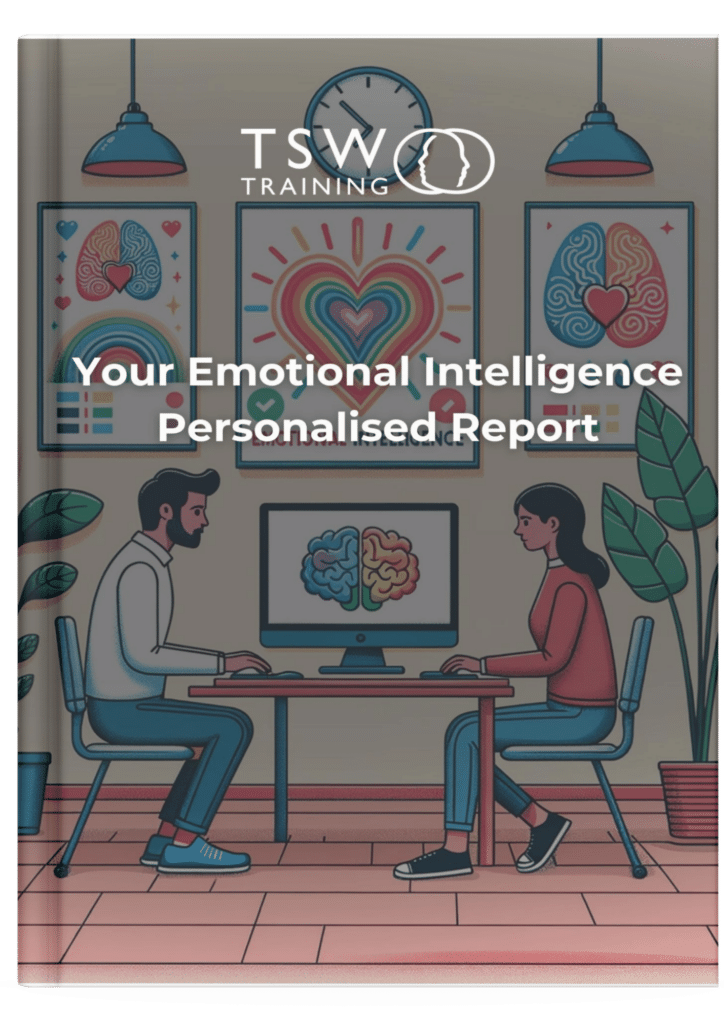Emotional Intelligence (EI) is how well you can comprehend and regulate your own and other people’s emotions. It comes naturally to some, but not others. Luckily Emotional Intelligence is a skill that can be improved through courses or through self-study.
EI has been around as a concept since the 1990’s but it became popular after Daniel Goleman published his 1995 book Emotional Intelligence: Why It Can Matter More Than IQ.
So let’s take a look at a few more books that can help boost your emotional intelligence:
Our top 10 recommended books on Emotional Intelligence
#1. At the Heart of Leadership: How To Get Results with Emotional Intelligence – Joshua Freedman
Drawing on his experience and data gathered from his time working for some top companies (including the US Marine Corps and FedEx), Freedman’s book provides you with a free EI test. It explains what Emotional Intelligence is and why it’s important before you dive into actionable ways to work on your own EI.
At the Heart of Leadership is an easy read which provides Emotional Intelligence models that allow you to actually put into practice what you learn.
#2. Emotional Intelligence 2.0 – by Travis Bradberry
Bradberry’s book is another that starts off with an EI test. The book is broken up into one section for each of the EI categories, and it’s recommended that you start with those sections where you scored lowest.
You’ll find examples of how to improve your skills in each category, plus case studies of workers with high and low Emotional Intelligence with details on how their colleagues viewed them.
While the book is a little self-promotional, it’s a quick, engaging read to help boost your EI.
#3.Leadership: The Power of Emotional Intelligence – by Daniel Goleman
This book is a collection of Goleman’s articles on leadership and emotional intelligence. Each article offers a different look at the connections between good leadership and Emotional Intelligence, focussing on areas such as self-awareness and relationship management.
If you’re an experienced leader, you might find this book contains a lot of knowledge you already have. But for those just starting out as team leaders or managers, it’s a handy companion to have.
#4. Quick Emotional Intelligence Activities for Busy Managers – by Adele Lynn
If you’re looking to just get straight to putting theory into practice, Lynn’s book offers 50 exercises to improve your and your team’s emotional intelligence. Yep 50.
The exercises can help you identify moods and deal with triggers, deal with conflict, encourage communication and overcome obstacles by working together. If you already do a lot of team activities you might recognise a few, but with 50 to choose from there’s likely some that’ll be new to you.
#5. 105 Tips for Creating an Emotionally Intelligent Organization – by Gary Vurnum and Patrick Merlevede
If 50 activities wasn’t enough for you, here’s a book that contains 105 practical tips to encourage employees to empathise with each other, improve collaboration, communication and motivation.
Both Vurnum and Merlevede are trainers in their day-to-day job, which is where they draw their inspiration for all their ideas. This book starts by explaining what makes an emotionally intelligent organisation before it gets on to the 105 tips to help leaders navigate their teams through different stages of their careers.
Take our free emotional intelligence test today and get a detailed report with targeted tips and techniques to skyrocket your EQ.

#6. The Emotionally Intelligent Manager – by David R. Caruso and Peter Salovey
This book is about breaking free of the belief that feelings should be experienced in a controlled way, especially at work. Cruso and Salovey’s book is designed to help show you that yours and other’s emotions can be helpful when it comes to making decisions, solving problems and resolving conflict.
The book is split into four sections, each about its own topic designed to help you use your emotions to become a better leader, with practical examples.
#7. Emotional Agility: Get Unstuck, Embrace Change, and Thrive in Work and Life – by Susan David
David’s book explains that you should treat your emotions like a compass, letting them guide you and helping you remember your core values. If you can successfully navigate your emotions you’ll more easily be able to make choices that benefit you, which can in turn benefit your workplace.
Compared to the other books in this list, Emotional Agility has fewer practical activities, but if you’re wanting to find out more about your emotions, then this could be the book for you.
#8. Emotional Intelligence for Sales Success – by Colleen Stanley
If you work in sales, this book provides information that could help you better connect with people that make decisions. You’ll learn how to use your Emotional Intelligence to help you boost your sales and relate to customers.
It covers common sales problems and how to overcome them, and also provides a range of exercises that you can use to boost your EI (and hopefully your sales figures too).
#9. The EQ Difference: A Powerful Plan for Putting Emotional Intelligence to Work – by Adele B. Lynn
The EQ Difference offers up case studies, EI tests and activities you can do with your team in order to boost your Emotional Intelligence. This book aims to help you increase the emotional quotient of your organisation by improving your skills to boost your efficiency.
It starts off by explaining how your feelings influence your behaviour and then goes on to discuss how you can train yourself to use your emotions to your advantage. The last section breaks down how you can use the 5 steps of EI at work to improve your performance.
#10. Dare to Lead – by Brené Brown
This book is aimed at helping leaders become braver and more daring. It encourages you to stay curious, share accountability and be vulnerable, with a range of activities to help you become a better leader.
Split into four parts, the book begins by discussing vulnerability, and then putting your values into practice. The third section tells you how to build trust with your colleagues, with the final part focusing on your emotions and being self-aware enough to recognise how others feel.
3 recommended ‘outside-the-box’ books on Emotional Intelligence
The 10 books listed above are specifically about how to improve your EI in the workplace.
So here’s 3 suggestions that might help you think differently and feel more intelligently in all aspects of your life:
#1. Thinking, Fast and Slow – by Daniel Kahneman
This book is so popular, you might have already read it. This book talks about the two different ways you can think – system 1, which is the default fast and impulsive way of thinking, and system 2, the slower and more rational method of your brain.
You’ll gain insights into why you think and behave in certain patterns, and you’ll find plenty of tips on how to slow your mind down and think smarter.
#2. What Every Body is Saying: An Ex-FBI Agent’s Guide to Speed-Reading People – by Joe Navarro
Who doesn’t want to know what other people are thinking and feeling? This book teaches you about how to realistically read people’s body language – in particular how comfortable they are – to better understand how they might be feeling.
It also gives you pointers on how to adapt your own body language to establish trust and authority, as well as explaining what others may think of you because of your body position.
#3. The Emotional Life of Your Brain – by Richard J. Davidson and Sharon Begley
In Davidson and Begley’s book, you’ll get to see interesting anecdotes of how we think of and react differently to the same situations. It will help you recognise your emotional style and how you can improve your emotional regulation. They also offer insight into conditions like autism and depression.
Written by a neuroscientist and science-writer, this book is jammed full of examples of their experiences and experiments in studying emotions and reactions, with scientific backup. It also has questionnaires for you to gauge your own emotional style, with advice on how to change it if you’d like to.
Other resources to help improve your emotional intelligence
Here are 10 of our favourite articles to help you boost your emotional intelligence:
- How To Improve Your Emotional Intelligence (EI) With Training, Books & Other Resources
- The Benefits of Developing Emotional Intelligence in the Workplace
- The Importance Of Self-Awareness In Emotional Intelligence
- Improve self-confidence for you and your team
- Self-Regulation: How To Develop It & Become A Better Leader
- Empathy – Why Is It Important In Leadership? – TSW Training
- How To Effectively Motivate Your Team – TSW Training
- How to use the Emotion Wheel to enhance emotional intelligence
- What Are The Signs Of Low Emotional Intelligence and how to overcome them
- How to Apply Emotional Intelligence to Conflict Resolution in the Workplace
5 of our recommended activities to improve your emotional intelligence:
- Florida State University’s emotional intelligence workbook
- Nottingham University’s emotional intelligence in the workplace workbook
- 27 activities to improve self-awareness
- 5 questions to double your emotional intelligence
- NHS STOPP worksheet for improving self-regulation
5 great podcasts discussing emotional intelligence:
- Daniel Goleman: Emotional Intelligence 101
- Understanding Emotions podcast
- Emotions Mentor podcast
- Mindset Monday podcast
- This Spotify playlist of emotional intelligence podcasts




















